Introduction to Dogmatics
By Len Mier

In this first essay I will be discussing the ways in which we can know God as summarized from Metropolitan John Zizioulas’ Lectures in Christian Dogmatics. The goal is to address the understanding of knowledge of God and that of knowing God.
To start, what is knowledge, or how do we know? What we are talking about is how we have knowledge about something. A simple example is when we see an object we have never seen before, we identify, through our senses, that it has a specific shape and physical characteristics. We start a process of matching it to images of things familiar to us, so that through a process of saying what the object is or is not, we reach a conclusion saying that we have knowledge of what that physical object is.
This is fairly easy to do for objects that are perceivable or inanimate, and is easy to gain knowledge through use of our senses. But is this the same as saying we know these things? The problem comes when an object we want to know or gain knowledge of does not have a physical manifestation. How can we have knowledge of these things or can we know them?
When we talk about knowledge of God we talking about the ability to ascribe to Him relatable, identifiable attributes. Or through a process of negation, saying what He is not. We can say God is all good, all powerful, and all loving. But is this the same as saying we know God? Identifying attributes can describe Him, but do we know Him in the same way we know an object or another person? Is knowing and recognizing what a chair is the same as knowing God?
Many theologians go into great depth on how we know God. The primary idea in knowing God is that it is done freely. We are free to know or reject God. God does not force this knowledge on us. This freedom is based in love and in the community of believers. As Metropolitan Zizioulas tells us, this love is the communion, or relationship, created by the community of the Church and its members. This love is not the emotion that is so popularly talked about in modern society, but is that mutual relationship or bond between members of a community. Knowing someone is also identifying with that person, if we lose our identification with that person we lose knowing them.
How can we identify with something we have not seen? We can say that although we have only seen Christ in the eyes of our faith we can still use Him to gain knowledge of God. Maximos the Confessor tells us that Christ is the Logos of God, and that it is through this Logos we can come to know God.
It is the personal relationship of love, the Father has with His son, which we can start to have knowledge of God. Only in this most intimate relationship, of the Son identifying himself with the Father, can we then start to know God. It is this loving relationship that makes the Father truly known to us. The Gospel of Matthew gives some insight to this relationship:
All things have been handed over to me by my Father. No one knows the Son except the Father, and no one knows the Father except the Son and anyone to whom the Son wishes to reveal him.” (Matthew 11:27)
It is in this relationship of the Father and Son that the knowing of God is revealed to us. Knowing God cannot be gained in isolation but only through engagement with the Son. Knowing the Son cannot be done in isolation but only in engaging our neighbor. It is in this experience of engaging the Son do we gain knowledge. How does the Son reveal this to us? He revealed it by charging us to follow his example, do unto others as I have done for you.
For knowing to be real, it has to be based on our experience. Knowing becomes real when we freely start to imitate that person we want to know. We have to identify, or take on, Jesus’ identity. In taking on this identity, God and his Son should become real to us. Jesus freely revealed the personal relationship of
God as our Father. Jesus imitated the Father by doing his will. When we imitate Jesus in word and action we place ourselves in a relationship with Him and by extension in a relationship with the Father.
In summary we can say we have gone beyond having knowledge of God to knowing God when the following happens in our lives. We freely accept God’s love. We build up this bond of love with Him through imitating the actions of Jesus – His love being expressed in the community of believers and society. This knowing of God becomes truly real by our actions becoming the same as actions of Jesus. The revelation of the Father’s love for us, manifested in our actions and interactions, makes real for us God and thereby we can truly know Him.
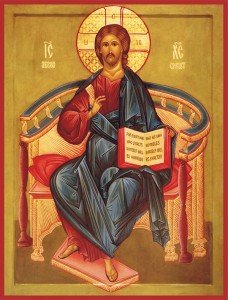 Our first reading this weekend is again taken from Paul’s first letter to the Corinthians. In the passage we hear, he again reminds the Corinthians and us that he has preached the Lord crucified and risen from the dead. He also states that he himself saw the resurrected Christ. He then states this: “by God’s favor I am what I am. This favor of His to me has not proved fruitless”.
Our first reading this weekend is again taken from Paul’s first letter to the Corinthians. In the passage we hear, he again reminds the Corinthians and us that he has preached the Lord crucified and risen from the dead. He also states that he himself saw the resurrected Christ. He then states this: “by God’s favor I am what I am. This favor of His to me has not proved fruitless”.
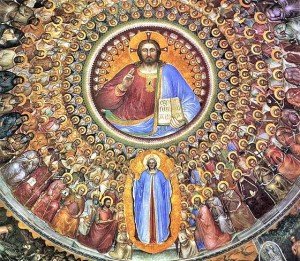
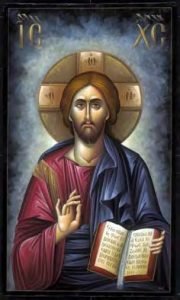 While I realize that this might been a challenging article, I continue it because it is my hope and prayer that the people who read my Bulletin might be as well-informed as possible. I also truly believe that my readers can gain benefit from such information.
While I realize that this might been a challenging article, I continue it because it is my hope and prayer that the people who read my Bulletin might be as well-informed as possible. I also truly believe that my readers can gain benefit from such information.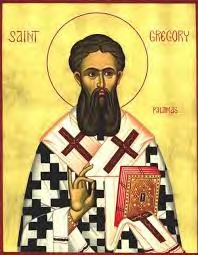 Gregory closes his fourth oration by analyzing the actual titles of the Son. While the being of God “cannot be expressed in words,” Gregory does believe it is possible to “sketch Him by His attributes, and so obtain a certain faint and feeble and partial idea concerning Him. Gregory’s catalogue of 15 divine names and attributes includes the following:
Gregory closes his fourth oration by analyzing the actual titles of the Son. While the being of God “cannot be expressed in words,” Gregory does believe it is possible to “sketch Him by His attributes, and so obtain a certain faint and feeble and partial idea concerning Him. Gregory’s catalogue of 15 divine names and attributes includes the following: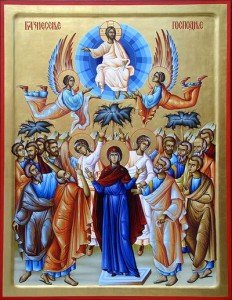
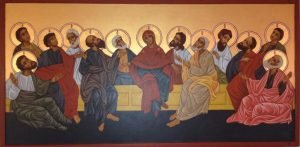 The first reading assigned for the 11th weekend after Pentecost is taken from St. Paul’s first letter to the Corinthians (1 Cor 9:2-12). In the portion of his letter that we proclaim, Paul is asserting his right as Christ’s legitimate Apostle. Paul was being criticized for not using the rights of his apostolate. Some were concluding that his non-use of such rights was proof that he was not really an apostle. Paul lists, besides his freedom in matters of food and drink, two other apostolic rights that he freely renounced – marriage and support from the churches.
The first reading assigned for the 11th weekend after Pentecost is taken from St. Paul’s first letter to the Corinthians (1 Cor 9:2-12). In the portion of his letter that we proclaim, Paul is asserting his right as Christ’s legitimate Apostle. Paul was being criticized for not using the rights of his apostolate. Some were concluding that his non-use of such rights was proof that he was not really an apostle. Paul lists, besides his freedom in matters of food and drink, two other apostolic rights that he freely renounced – marriage and support from the churches.